Charles Bukowski was born in Germany in 1920 and moved to the United States at age three and was raised in Los Angeles.
After briefly attending Los Angeles City College, Bukowski moved to New York City with aspirations to be a writer, but his initial lack of publishing success led him to abandon writing for ten years during which he struggled with alcoholism.
After a health scare, he resumed writing while working an array of jobs, from dishwasher and mail carrier to factory worker and elevator operator.
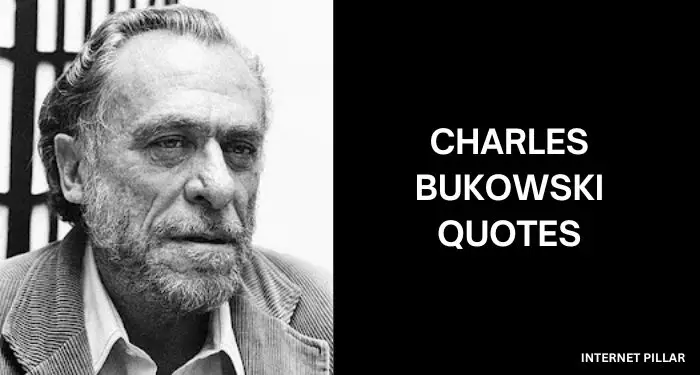
Bukowski’s writings often portrayed a bleak metropolitan environment inhabited by downtrodden Americans, characterized by direct language, violence and sexual imagery.
Many of his works revolve around an autobiographical figure, Henry Chinaski. He began writing poetry at thirty-five and published his first book of poetry in 1959.
Related: Thomas Fuller Quotes and Earl Nightingale Quotes
Over his lifetime, Bukowski authored over forty-five books of poetry and prose, such as Pulp, Screams from the Balcony and The Last Night of the Earth Poems. Bukowski succumbed to leukemia in 1994.
I have compiled the best quotes from Charles Bukowski for you.
Best Charles Bukowski Quotes
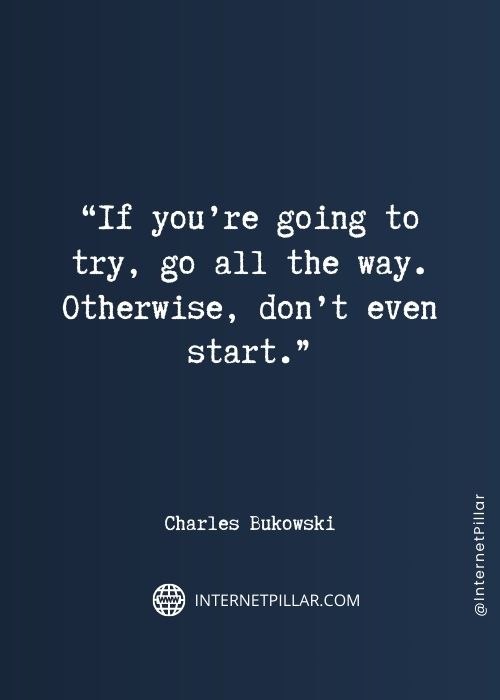
1. “If you’re going to try, go all the way. Otherwise, don’t even start.” ~ (Charles Bukowski).
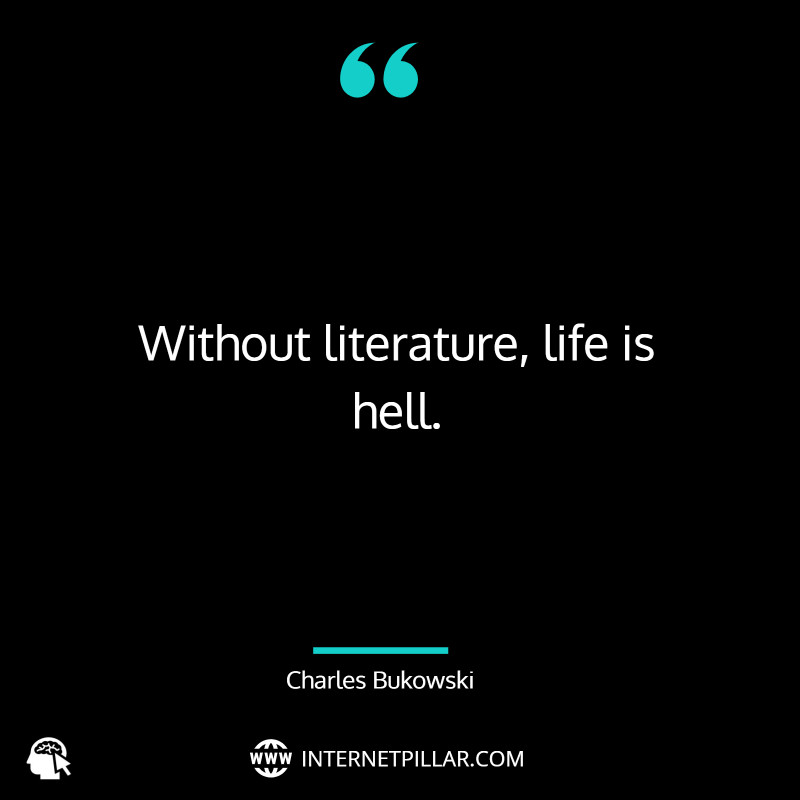
2. “Without literature, life is hell.” ~ (Charles Bukowski).

3. “The problem with the world is that the intelligent people are full of doubts, while the stupid ones are full of confidence.” ~ (Charles Bukowski).
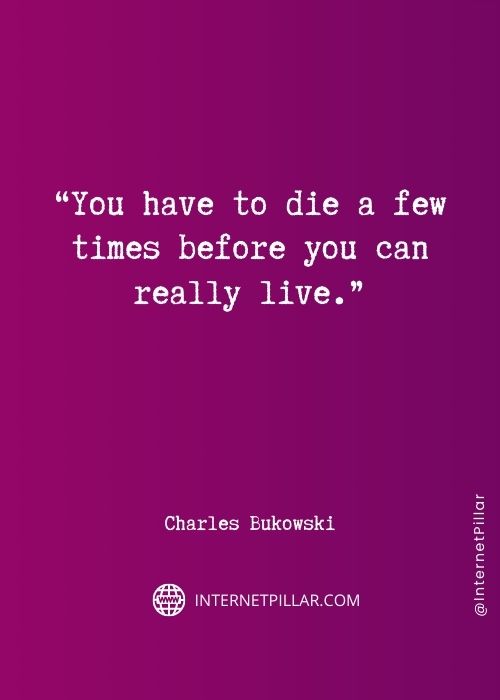
4. “You have to die a few times before you can really live.” ~ (Charles Bukowski).

5. “Understand me. I’m not like an ordinary world. I have my madness, I live in another dimension and I do not have time for things that have no soul.” ~ (Charles Bukowski).

6. “Find what you love and let it kill you.” ~ (Charles Bukowski).
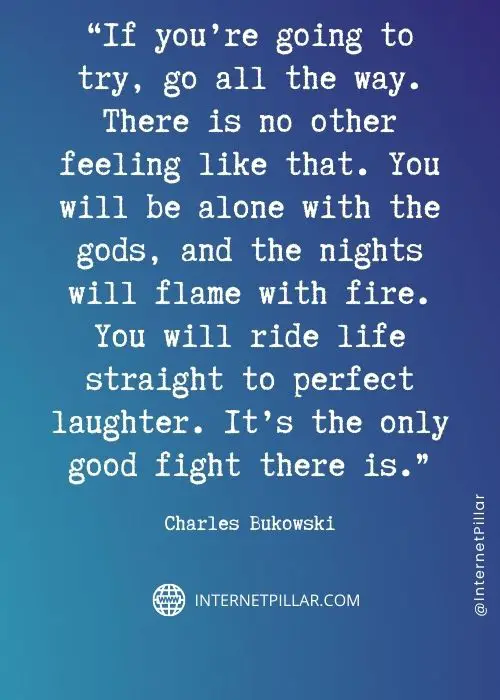
7. “If you’re going to try, go all the way. There is no other feeling like that. You will be alone with the gods, and the nights will flame with fire. You will ride life straight to perfect laughter. It’s the only good fight there is.” ~ (Charles Bukowski).

8. “Some people never go crazy. What truly horrible lives they must lead.” ~ (Charles Bukowski).

9. “Life’s as kind as you let it be.” ~ (Charles Bukowski).
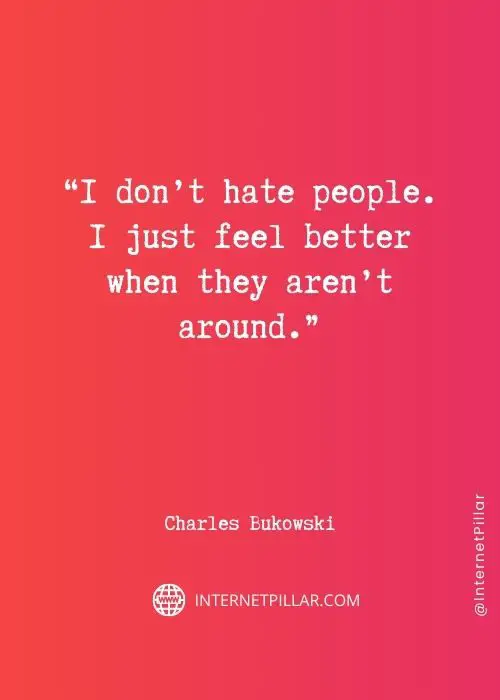
10. “I don’t hate people. I just feel better when they aren’t around.” ~ (Charles Bukowski).
11. “An intellectual says a simple thing in a hard way. An artist says a hard thing in a simple way.” ~ (Charles Bukowski).

12. “I have no time for things that have no soul.” ~ (Charles Bukowski).
13. “We are here to laugh at the odds and live our lives so well that Death will tremble to take us.” ~ (Charles Bukowski).
14. “If something burns your soul with purpose and desire, it’s your duty to be reduced to ashes by it. Any other form of existence will be yet another dull book in the library of life.” ~ (Charles Bukowski).
15. “Sometimes you climb out of bed in the morning and you think, I’m not going to make it, but you laugh inside – remembering all the times you’ve felt that way.” ~ (Charles Bukowski).
16. “Wherever the crowd goes, run in the other direction. They’re always wrong.” ~ (Charles Bukowski).
17. “The less I needed, the better I felt.” ~ (Charles Bukowski).
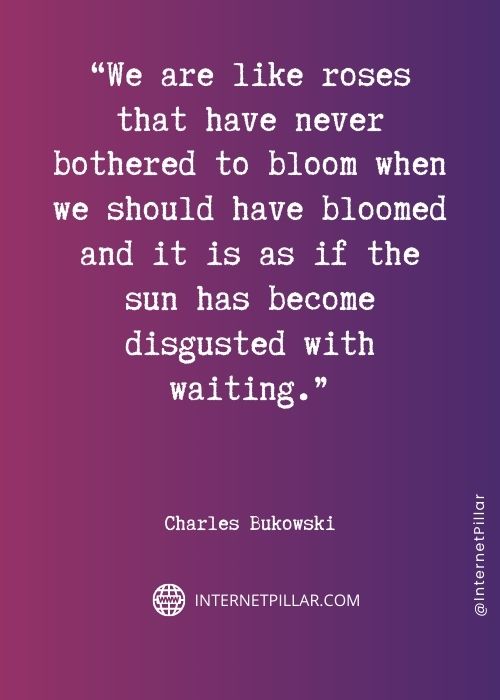
18. “We are like roses that have never bothered to bloom when we should have bloomed and it is as if the sun has become disgusted with waiting.” ~ (Charles Bukowski).
19. “Writers are desperate people and when they stop being desperate they stop being writers.” ~ (Charles Bukowski).
20. “Invent yourself and then reinvent yourself.” ~ (Charles Bukowski).
Top Charles Bukowski Quotes
21. “Nothing can save you except writing. It keeps the walls from failing.” ~ (Charles Bukowski).
22. “We’re all going to die, all of us, what a circus! That alone should make us love each other but it doesn’t. We are terrorized and flattened by trivialities, we are eaten up by nothing.” ~ (Charles Bukowski).
23. “Drink from the well of yourself and begin again.” ~ (Charles Bukowski).
24. “I wanted the whole world or nothing.” ~ (Charles Bukowski).

25. “If you have the ability to love, love yourself first.” ~ (Charles Bukowski).
26. “Don’t fight your demons. Your demons are here to teach you lessons. Sit down with your demons and have a drink and a chat and learn their names and talk about the burns on their fingers and scratches on their ankles. Some of them are very nice.” ~ (Charles Bukowski).
27. “We don’t even ask for happiness, just a little less pain.” ~ (Charles Bukowski).
28. “I have one problem, I don’t hate people. They disgust me and I want to get away from them. I do not have hatred. I have an escape mechanism.” ~ (Charles Bukowski).
29. “You can’t beat death but you can beat death in life, sometimes. And the more often you learn to do it, the more light there will be. Your life is your life. Know it while you have it.” ~ (Charles Bukowski).
30. “People empty me. I have to get away to refill.” ~ (Charles Bukowski).
31. “There’s a light somewhere. It may not be much light but it beats the darkness.” ~ (Charles Bukowski).
32. “Simplicity is always the secret, to a profound truth, to doing things, to writing, to painting. Life is profound in its simplicity.” ~ (Charles Bukowski).
33. “If you’re going to try, go all the way. This could mean losing girlfriends, wives, relatives, jobs and maybe your mind.” ~ (Charles Bukowski).
34. “I stopped looking for a Dream Girl, I just wanted one that wasn’t a nightmare.” ~ (Charles Bukowski).
35. ““Baby,” I said, “I’m a genius but nobody knows it but me.”” ~ (Charles Bukowski).
36. “Only the boring get bored.” ~ (Charles Bukowski).
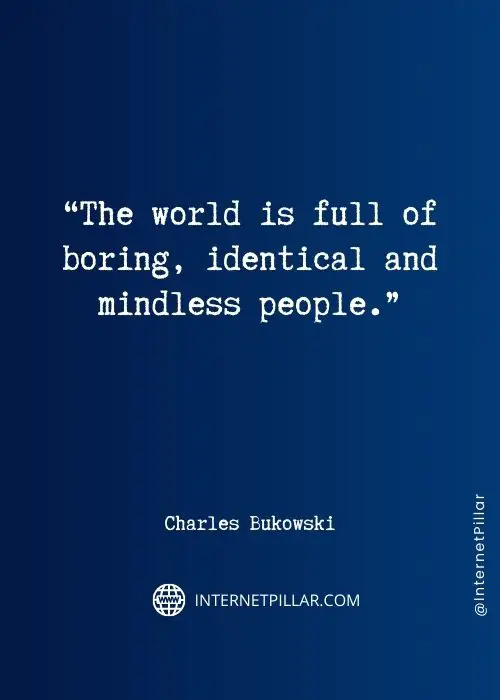
37. “The world is full of boring, identical and mindless people.” ~ (Charles Bukowski).
38. “If you let them kill you, they will.” ~ (Charles Bukowski).
39. “My heart is a thousand years old. I am not like other people.” ~ (Charles Bukowski).
40. “It wasn’t my day. My week. My month. My year. My life. God damn it.” ~ (Charles Bukowski).
41. “Beware of those who seek constant crowds; they are nothing alone.” ~ (Charles Bukowski).
42. “If you are going to try, go all the way or don’t even start. If you follow it you will be alive with the gods. It is the only good fight there is.” ~ (Charles Bukowski).
43. “Those who escape hell however never talk about it and nothing much bothers them after that.” ~ (Charles Bukowski).
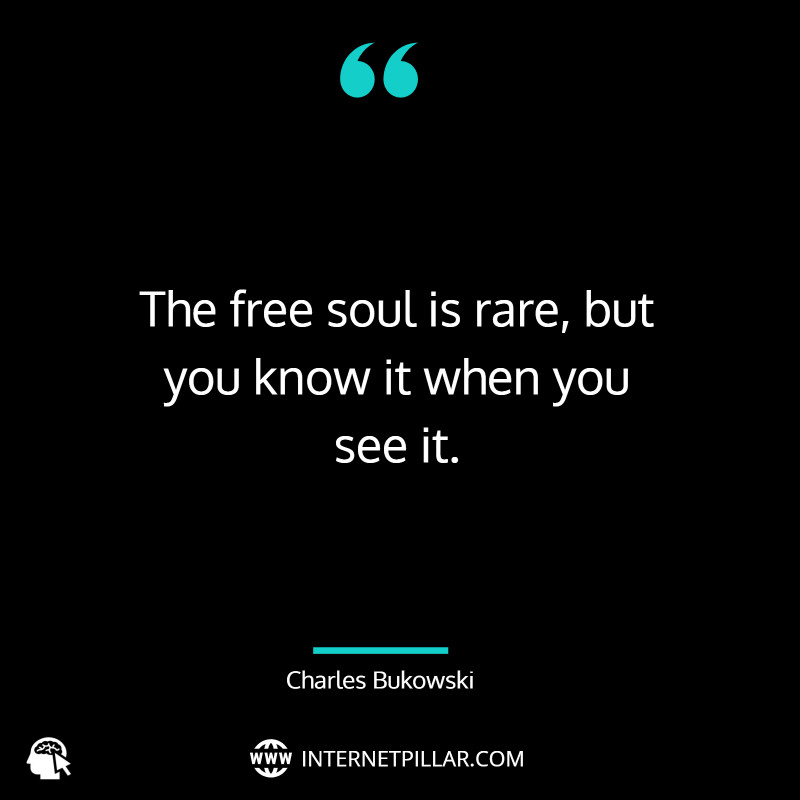
44. “The free soul is rare, but you know it when you see it.” ~ (Charles Bukowski).
45. “My ambition is handicapped by laziness.” ~ (Charles Bukowski).
46. “Love breaks my bones and I laugh.” ~ (Charles Bukowski).
47. “I am not a snob; it is simply that I am not interested with what most people have to say, or what they want to do – mostly with my time.” ~ (Charles Bukowski).
48. “I was a man who thrived on solitude; without it I was like another man without food or water. Each day without solitude weakened me. I took no pride in my solitude; but I was dependent on it. The darkness of the room was like sunlight to me.” ~ (Charles Bukowski).
49. “The empty, the angry, the lonely, the tricked, we are all museums of fear.” ~ (Charles Bukowski).
50. “I felt like crying but nothing came out. it was just a sort of sad sickness, sick sad, when you can’t feel any worse. I think you know it. I think everybody knows it now and then. but I think I have known it pretty often, too often.” ~ (Charles Bukowski).
Famous Charles Bukowski Quotes
51. “The courage it took to get out of bed each morning to face the same things over and over was enormous.” ~ (Charles Bukowski).
52. “The difference between a democracy and a dictatorship is that in a democracy you vote first and take orders later; in a dictatorship you don’t have to waste your time voting.” ~ (Charles Bukowski).
53. “There’s a bluebird in my heart that wants to get out.” ~ (Charles Bukowski).
54. “Let it die. Let there be a new beginning. It’s awful. Goodnight.” ~ (Charles Bukowski).
55. “I’ve had so many knives stuck into me, when they hand me a flower I can’t quite make out what it is. It takes time.” ~ (Charles Bukowski).
56. “It’s possible to love a human being if you don’t know them too well.” ~ (Charles Bukowski).
57. “If you’re losing your soul and you know it, then you’ve still got a soul left to lose.” ~ (Charles Bukowski).
58. “The crowd is the gathering place of the weakest; true creation is a solitary act.” ~ (Charles Bukowski).
59. “Death is not the problem; waiting around for it is.” ~ (Charles Bukowski).
60. “You begin saving the world by saving one man at a time; all else is grandiose romanticism or politics.” ~ (Charles Bukowski).
61. “If I never see you again I will always carry you inside outside on my fingertips and at brain edges and in centers of what I am of what remains.” ~ (Charles Bukowski).
62. “The area dividing the brain and the soul Is affected in many ways by experience – Some lose all mind and become soul: insane. Some lose all soul and become mind: intellectual. Some lose both and become: accepted.” ~ (Charles Bukowski).
63. “Before my death I hope to obtain my life.” ~ (Charles Bukowski).
64. “There is a place in the heart that will never be filled; a space. And even during the best moments, and the greatest times, we will know it.” ~ (Charles Bukowski).
65. “If I stop writing I am dead. And that’s the only way I’ll stop: dead.” ~ (Charles Bukowski).
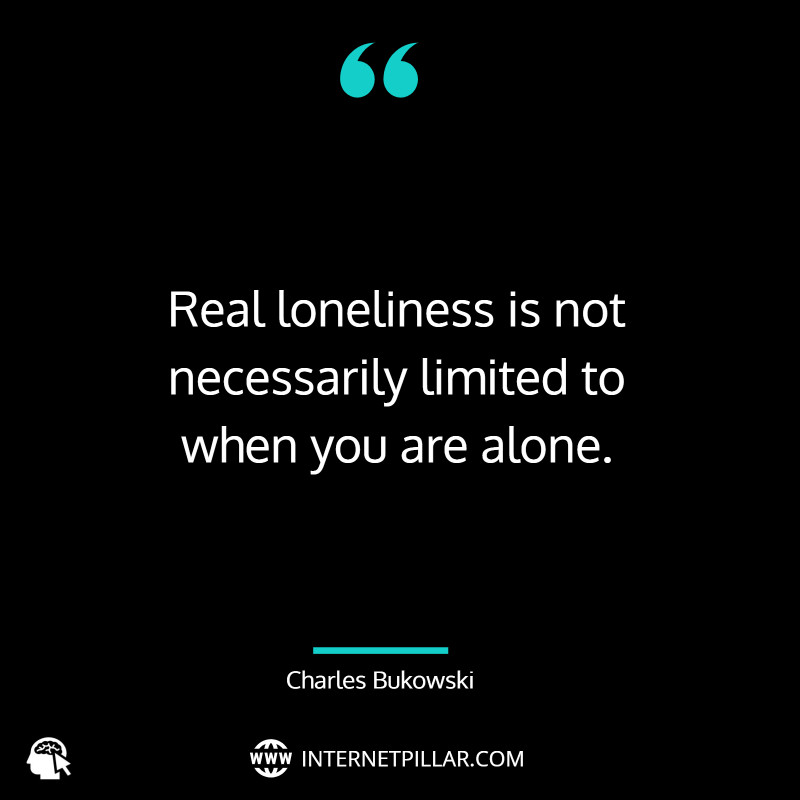
66. “Real loneliness is not necessarily limited to when you are alone.” ~ (Charles Bukowski).
67. “There’s music in everything, even defeat.” ~ (Charles Bukowski).
68. “We are all museums of fear.” ~ (Charles Bukowski).
69. “The more cats you have, the longer you live. If you have a hundred cats, you’ll live ten times longer than if you have ten. Someday this will be discovered, and people will have a thousand cats and live forever.” ~ (Charles Bukowski).
Short Charles Bukowski Quotes
70. “To create art means to be crazy alone forever.” ~ (Charles Bukowski).
71. “Poetry is what happens when nothing else can.” ~ (Charles Bukowski).
72. “The secret is writing down one simple line after another.” ~ (Charles Bukowski).
73. “I am a poem. There is no way out.” ~ (Charles Bukowski).
74. “I want to let her know though that all the nights sleeping beside her even the useless arguments were things ever splendid and the hard words I ever feared to say can now be said: I love you.” ~ (Charles Bukowski).
75. “And yet women-good women – frightened me because they eventually wanted your soul, and what was left of mine, I wanted to keep.” ~ (Charles Bukowski).
76. “Why did I come here? I thought. Why is it always only a matter of choosing between something bad and something worse?” ~ (Charles Bukowski).
77. “Lighting new cigarettes, pouring more drinks. It has been a beautiful fight. Still is.” ~ (Charles Bukowski).
78. “I no longer want it all, just some comfort and some sex and some minor love.” ~ (Charles Bukowski).
79. “That was all a man needed: hope. It was lack of hope that discouraged a man.” ~ (Charles Bukowski).
80. “I am ashamed to be a member of the human race but I don’t want to add any more to that shame, I want to scrape a little of it off.” ~ (Charles Bukowski).
81. “I tell you such fine music waits in the shadows of hell.” ~ (Charles Bukowski).
82. “Look, let me put it this way: with me, you’re number one and there isn’t even a number two.” ~ (Charles Bukowski).
83. “Don’t wait for the good woman. She doesn’t exist. There are women who can make you feel more with their bodies and their souls but these are the exact women who will turn the knife into you right in front of the crowd.” ~ (Charles Bukowski).
84. “Existence was not only absurd, it was plain hard work. Think of how many times you put on your underwear in a lifetime. It was appalling, it was disgusting, it was stupid.” ~ (Charles Bukowski).
Inspiring Charles Bukowski Quotes
85. “I never met another man I’d rather be. And even if that’s a delusion, it’s a lucky one.” ~ (Charles Bukowski).
86. “Bad luck for the young poet would be a rich father, an early marriage, an early success or the ability to do anything well.” ~ (Charles Bukowski).
87. “There’s a bluebird in my heart that wants to get out but I’m too tough for him, I say, stay in there, I’m not going to let anybody see you.” ~ (Charles Bukowski).
88. “People don’t need love. What they need is success in one form or another. It can be love but it needn’t be.” ~ (Charles Bukowski).
89. “I can almost understand why people leap from bridges.” ~ (Charles Bukowski).

90. “Humanity, you never had it to begin with.” ~ (Charles Bukowski).
91. “I’m too careless. I don’t put out enough effort. I’m tired.” ~ (Charles Bukowski).
92. “Play the Piano Drunk Like a Percussion Instrument Until the Fingers Begin to Bleed a Bit.” ~ (Charles Bukowski).
93. “Those who preach god, need god Those who preach peace do not have peace Those who preach love do not have love.” ~ (Charles Bukowski).
94. “Lawyers, doctors, plumbers, they all made the money. Writers? Writers starved. Writers suicided. Writers went mad.” ~ (Charles Bukowski).
95. “Each man’s hell is in a different place: mine is just up and behind my ruined face.” ~ (Charles Bukowski).
96. “I guess we often get the deep blues, both of us, and wonder what it all means- the people, the buildings, the day by day things, the waste of time, of ourselves.” ~ (Charles Bukowski).
97. “It’s not so much that nothing means anything but more that it keeps meaning nothing. there’s no release, just gurus and self- appointed gods and hucksters. the more people say, the less there is to say. even the best books are dry sawdust.” ~ (Charles Bukowski).
98. “All a guy needed was a chance. Somebody was alway controlling who got a chance and who didn’t.” ~ (Charles Bukowski).
99. “Sometimes you just have to pee in the sink.” ~ (Charles Bukowski).
100. “A spark can set a whole forest on fire. Just a spark. Save it.” ~ (Charles Bukowski).
101. “Bad poetry is caused by people who sit down and think, Now I am going to write a Poem.” ~ (Charles Bukowski).
You Might Like
- Leo Tolstoy Quotes
- Grant Cardone Quotes
- Isaac Newton Quotes
- Denis Waitley Quotes
- Sigmund Freud Quotes
- Og Mandino Quotes
- Barack Obama Quotes
- Michelle Obama Quotes
Short Biography of Charles Bukowski
Henry Charles Bukowski, a German-American poet, novelist, and short story writer, deeply reflected the culture and economic challenges of Los Angeles in his work.

He vividly portrayed the struggles of ordinary Americans, the writing process, alcohol, and relationships.
| Full Name | Heinrich Karl Bukowski |
| Born | August 16, 1920 Andernach, Prussia, Germany |
| Died | March 9, 1994 (aged 73) Los Angeles, California, U.S. |
| Nationality | German; American |
| Occupations | Poet, Novelist, Short Story Writer, Columnist |
| Movement | Dirty Realism, Transgressive Fiction |
| Spouses | Barbara Frye(m. 1957; div. 1959); Linda Lee Beighle (m. 1985) |
| Children | 1 |
Despite his broad publication in small presses and literary magazines, Bukowski was mainly recognized posthumously, especially in Europe.
Known for his candid style, he was celebrated as a voice of the “American lowlife” and remains influential in literary circles.
Quick Facts about Charles Bukowski
- Charles Bukowski was born on August 16, 1920, in Andernach, Germany.
- He moved to the United States with his parents at the age of three.
- Originally named Heinrich Karl Bukowski.
- Bukowski held various odd jobs including working in a slaughterhouse and a dog biscuit factory.
- He became known as the “Poet Laureate of Skid Row.”
- Bukowski wrote over 50 books during his lifetime.
- His first novel, “Post Office,” was published when he was 49 years old.
- Bukowski’s writing style is known for its raw, straightforward nature.
- He was a prolific letter writer throughout his life.
- Bukowski had a passion for horse racing, which influenced his writing.
- His work received mixed reviews initially but gained a loyal following over time.
- Bukowski never attended college.
- He frequently visited bars and drinking establishments.
- His works have been translated into multiple languages.
- Bukowski published his first poetry collection, “Flower, Fist, and Bestial Wail,” in 1959.
- He worked for the United States Postal Service for over a decade.
- Bukowski’s stories and poems often included autobiographical elements.
- His personal life was tumultuous, marked by failed relationships and alcoholism.
- Bukowski’s legacy continues to be celebrated globally.
- He was influenced by the Beat Generation writers like Jack Kerouac and Allen Ginsberg.
- His writings often feature strong, complex female characters.
- Bukowski’s work is characterized by an unapologetic portrayal of life’s hardships.
- He explored themes like poverty, alcoholism, and societal margins in his works.
- Bukowski was influenced by Russian novelist Fyodor Dostoevsky.
- His writing captures the essence of the human condition with unfiltered honesty.
- Bukowski’s early literary contributions were mostly poetry.
- He wrote his first story at the age of 24.
- His work provides a voice to the often overlooked or ignored.
- Bukowski’s writing remains influential in inspiring new writers.
- His career was marked by a unique voice and perspective that challenged societal norms.
Top Questions about Charles Bukowski
A: Charles Bukowski is renowned for novels such as “Post Office,” “Factotum,” and “Ham on Rye.” His poetry collections, including “Love is a Dog From Hell” and “The Last Night of the Earth Poems,” also contributed significantly to his fame.
A: Charles Bukowski is most recognized for his vivid and raw portrayal of urban life and the underprivileged in American society. His writing, which often includes direct language along with violent and sexual imagery, made him a cult figure in literature.
A: One of Bukowski’s notable quotes is: “If you’re losing your soul and you know it, then you’ve still got a soul left to lose. If you want to know who your friends are, get yourself a jail sentence. Never envy a man his lady. Behind it all lays a living hell.”
A: Yes, Charles Bukowski was a real person. Born on August 16, 1920, and dying on March 9, 1994, he was an American-German poet, novelist, and short story writer.
A: Bukowski described love as fleeting, akin to a morning fog that dissipates with the sunrise. He said, “Love is kind of like when you see a fog in the morning when you wake up before the sun comes out. It’s just a little while, and then it burns away… Love is a fog that burns with the first daylight of reality.”
A: Bukowski’s writing style was characterized by its raw, gritty realism and autobiographical elements. His straightforward, unembellished narrative often delved into the themes of sex, alcohol, gambling, and the challenges of ordinary life.
A: Charles Bukowski did not gain broad recognition during his lifetime and was mostly acknowledged posthumously. While he was a significant figure in underground literature, mainstream publishers and critics largely ignored his work during his life.
A: The legacy of Charles Bukowski endures through his depiction of human emotions and experiences. He continues to influence and resonate with readers who value his unfiltered perspectives on life.



